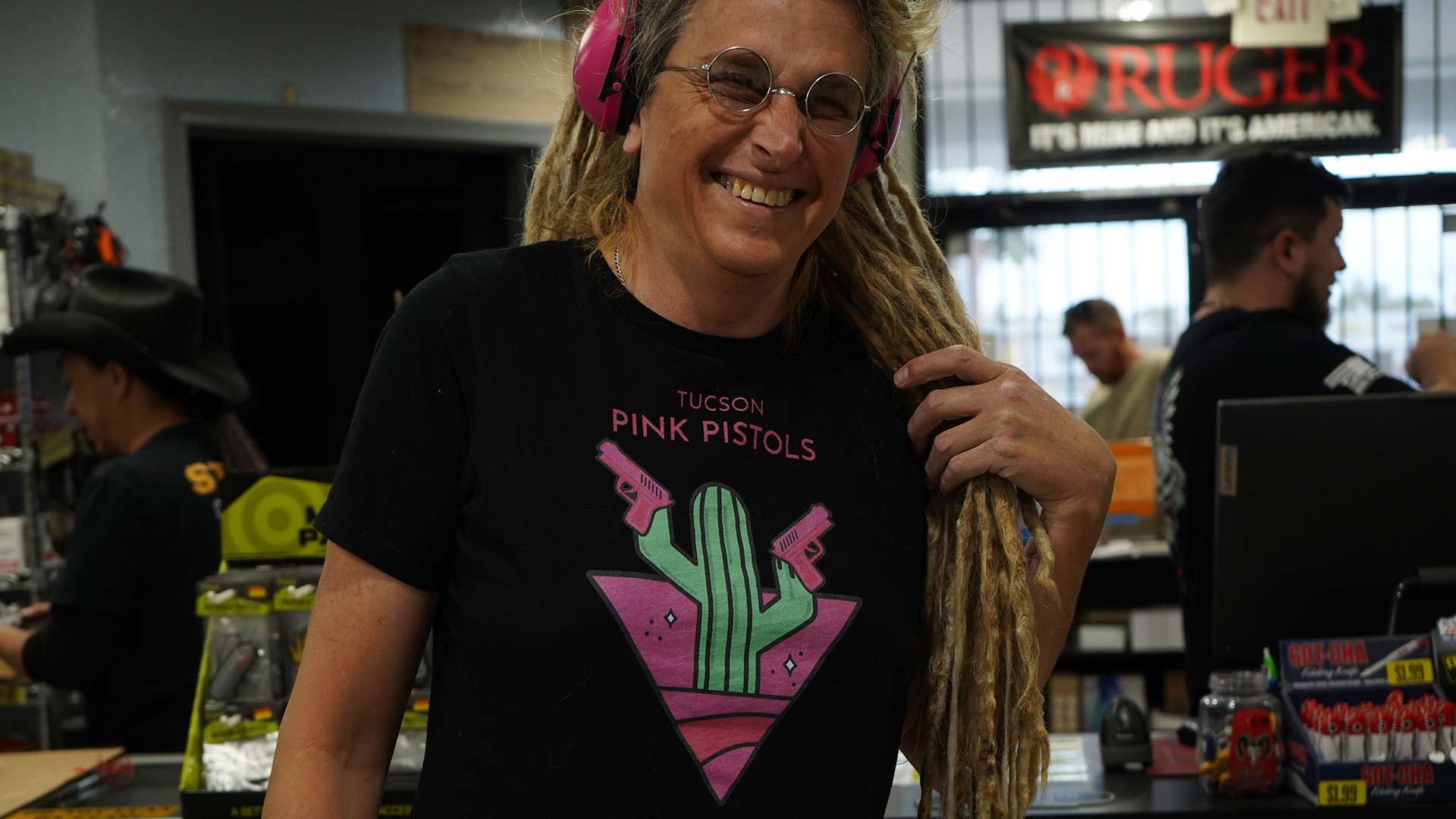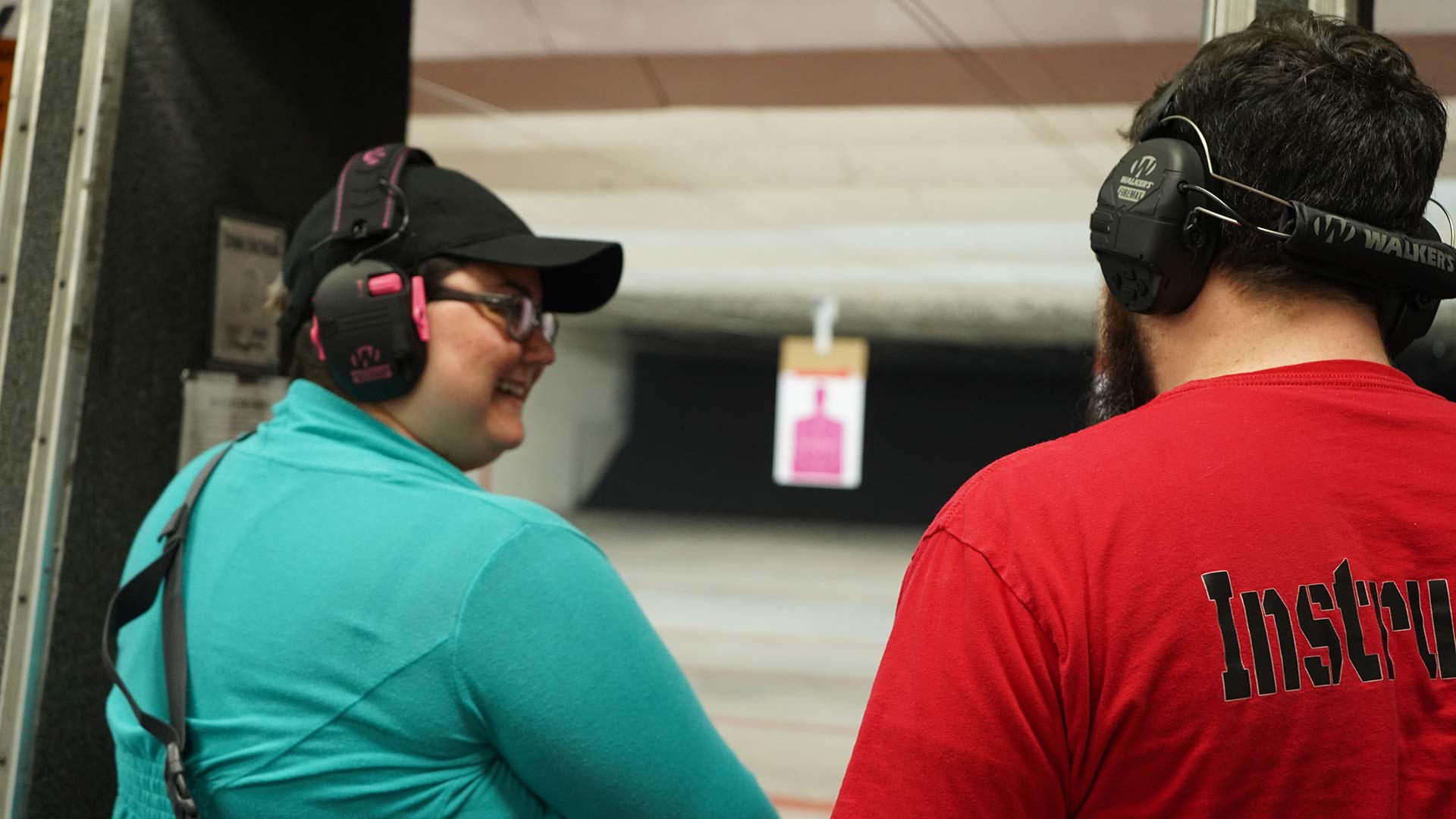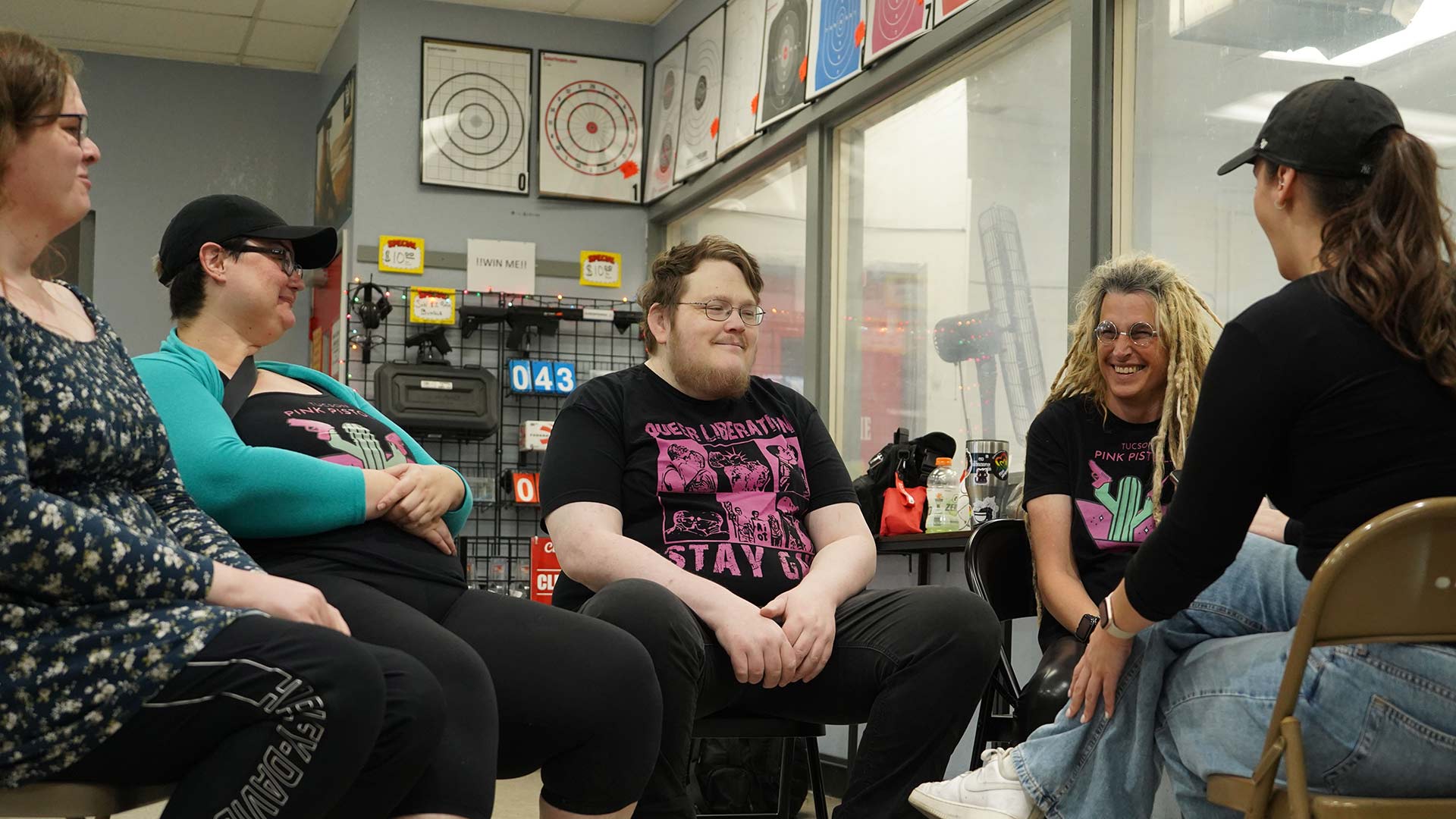 President of the Tucson Pink Pistols, April Gendill, showing off their logo t-shirt.
President of the Tucson Pink Pistols, April Gendill, showing off their logo t-shirt.
This story originally appeared on Arizona Spotlight on June 12, 2025.
What began as one trans woman’s desire to find a few shooting buddies has exploded into one of Tucson’s most dynamic grassroots organizations. Since its revival in January, the Tucson chapter of the Pink Pistols—a national LGBTQ+ gun rights group—has grown from an idea into a 500-member-strong community committed to education, empowerment, and collective safety.
“It started with me hoping maybe 10 people would show up,” said chapter president April Gendill. “Now we’re organizing raffles, hosting range days, and building something that feels like chosen family.”
Originally founded in 2000, Pink Pistols encourages LGBTQ+ individuals to arm themselves for self-defense in a world where queer communities are increasingly targeted. The Tucson chapter was defunct since 2013, until Gendill and two co-founders reactivated it earlier this year. Their first meeting was in February. By spring, it was clear: this wasn’t just a club, it was a community.
The group operates on two founding principles: support for LGBTQ+ rights and the constitutional right to bear arms. “You're a Pink Pistol if you say you are,” Gendill explained. There are no membership dues, no gatekeeping—just mutual respect and shared purpose.
Despite common assumptions, the group is intentionally apolitical. “We’re not here to debate politics,” said Cayce Kenney, the chapter’s Director of Digital Community and Safety.
“We’re here to make sure our members are safe, trained, and supported.”
Training is a cornerstone of the group’s mission. From firearm safety to trauma response classes like “Stop the Bleed,” members are working to become not just armed, but responsible. And thanks to local partnerships, including a tight-knit relationship with Zona Tactical, they’re finding welcoming spaces to do it.
 Tucson Pink Pistol's Director of People, Kitty Garden, and head RSO and instructor of Zona Tactical, Josh Robinson, doing a lesson at Zona Tactical gun range.
Tucson Pink Pistol's Director of People, Kitty Garden, and head RSO and instructor of Zona Tactical, Josh Robinson, doing a lesson at Zona Tactical gun range.
“We all have the same goal,” said Josh Robinson, chief RSO and instructor at Zona Tactical. “To protect ourselves and the people we love. No one should be excluded from that—no matter your race, gender, or identity.”
Robinson’s support has been key. “There’s mutual respect,” he said. “Sometimes you have to be your own first responder. And every law-abiding citizen deserves the tools and training to do that.”
In a community disproportionately impacted by mental health struggles and suicide, especially among queer and trans youth, Pink Pistols recognizes that being armed is only part of the equation.
“One of our board members works directly with Walk the Talk America,” said Kenney, referencing a nonprofit that connects gun owners to anonymous mental health services.
“We want our members to know it’s okay to not be okay—and you don’t have to go through it alone.”
The group doesn't offer formal therapy, but its support system is tangible. “If someone’s in crisis, it’s not uncommon for them to hand over their gun to a friend for safekeeping,” said Kitty Garden, the group’s Director of People.
“That’s the start and end of what community is—showing up for each other.”
Garden, who helped develop the chapter’s code of conduct, emphasizes care as much as preparedness. “We value life—ours and others’. That’s what responsible gun ownership should look like.”
Pink Pistols Tucson is grassroots at its core—funded through raffles, supported by queer-friendly businesses, and driven by volunteers. Members bring everything from legal expertise to design skills, helping create member handbooks, branded merchandise, and even a quirky mascot: Cassidy the Cactus.
“We’ve had local artists donate pins, and breweries give gift cards. It’s been amazing,” Garden said. “We expected closed doors. Instead, Tucson opened them.”
 Samantha Callicutt (far right) interviewing members of the Tucson Pink Pistols.
Samantha Callicutt (far right) interviewing members of the Tucson Pink Pistols.
The group’s next goals? First aid classes, outdoor range cleanups, and expanding their mutual aid efforts. A recent brass collection drive, where spent shell casings are turned in for cash, helped raise funds for training materials and community events. “It’s also a way to teach responsible gun ownership,” Gendill said. Tucson’s Pink Pistols is creating something rare: a gun community rooted in inclusion, empathy, and joy. Whether it's movie nights, shared meals, or crockpot dinners after the range, the group embodies a powerful blend of preparedness and connection.
“Joy is resistance,” Garden said. “We bury our friends in the morning, protest in the afternoon, and party at night. That’s how communities survive.”
As the group looks ahead, they hope to continue growing—100 members a month if they can. “I won’t be happy until every LGBTQIA+ person in Tucson knows we exist,” one member said.
In a country divided by debates over gun control and identity, Tucson’s Pink Pistols is showing that these conversations don’t have to be mutually exclusive.
“The Second Amendment isn’t just for one type of person,” Robinson said. “It’s for everyone.”
And in Tucson, “everyone” means queer, trans, cis, allies, left-leaning, conservative—and everyone in between.
“We’re not just armed,” Kenney said. “We’re seen. We’re together. And we’re not going anywhere.”

By submitting your comments, you hereby give AZPM the right to post your comments and potentially use them in any other form of media operated by this institution.